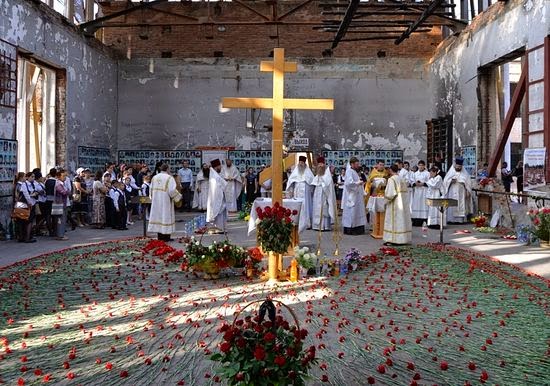"Will we bear witness to the truth in both our way of life and our way of death?"
by Fr. John Parker,
Orthodox Christian Network — September 1, 2014
I am an unworthy man, unworthy to be called an Orthodox Christian, not to speak of the priesthood, and I write, admittedly, from the comfort of my Mount Pleasant, SC, home. There is no Mount nearby, but it is, indeed, a pleasant seaside community on the East Coast of the United States.
As such, I ask myself: how to deal with ruthless, pitiless, pitiful souls who are so darkened that their life is spent taking the life of others—and worse, thinking that they are doing this at the direction of and with the blessing of God himself, with eternal reward?
Perhaps I will be criticized for my suggestion, sitting in my pleasant, mountless town, but we read recently that we must receive the Gospel as a child; and even a child will ask how could murder be returned by murder. Is violence—individual or large-scale—a possible Orthodox response?
What were the apostolic and post-apostolic, and later saint’s reactions to such vicious, vile, demonic actions?
How did the disciples respond to the beheading of John the Baptist, which we commemorated on August 29?
On the precipice of martyrdom, St Stephen, the Proto-martyr begged God to forgive his killers. Was there an apostolic uprising following that?
Hieromartyr Eutychius, disciple of St John the Theologian, was beheaded after starvation in prison, an attempt to burn him alive, and cruel beatings with iron rods…which were made to cease by his prayers. There is no account of retribution.
St Ignatius of Antioch instructed his loyal sons-and-daughters in Christ not to impede his march to martyrdom. “Do not hold me back from life!” was his essential command.
St Lawrence, the Hieromartyr, whose memory we kept in early August, commanded his captors, who had lit him on fire while encaged, to turn him over, since he was “done on that side”. There is not a record of retaliation.
The Hieromartyr Cyprian of Carthage, whom we remembered in the Church on August 31 was martyred by the sword as well—he, by pagans. Among his greatest contributions to the Christian faith was the acceptance of repentance of those who had apostatized, abandoned their one true love, Jesus Christ. He himself, though defending the true repentance of those who did commit apostasy under threat of death, did not betray Christ.















